Generative AI (GenAI) is a transformative technology for modern healthcare, promising to solve several critical industry challenges. By alleviating the workload of healthcare professionals, facilitating remote patient care, and streamlining administrative tasks, GenAI can significantly enhance efficiency and improve patient outcomes.
In this article, we review the key benefits of using generative AI for software development in healthcare, the challenges of using this technology, and ways Apriorit experts can help you with this process. We also present practical use cases that highlight how GenAI can be applied safely and effectively for key healthcare-related tasks.
This article will be useful for healthcare industry decision-makers who are debating whether to integrate GenAI into their software.
Why use generative AI in healthcare
Generative AI is a subset of artificial intelligence capable of producing new, original content by learning from existing data. This includes generating human-like text and realistic images, supporting contextualized conversations, and analyzing content.
Gen AI relies heavily on several key AI technologies:
- Neural networks are designed to mimic the human brain’s structure and function, consisting of nodes that process and transmit information. These networks can learn complex data representations and generate new data.
- Deep learning is a subset of machine learning that focuses on neural networks with many layers, called deep neural networks. These networks are trained on vast datasets, allowing the AI to generate new information that resembles training data.
- Natural language processing (NLP) is an AI field focused on the interaction between computers and human language. It enables machines to understand, interpret, and generate human-like texts.
Though GenAI has been around for years, after the success of OpenAI’s ChatGPT in 2022 it became a mainstream technology used in many industries. In healthcare, this technology can help unlock a piece of the unrealized $1 trillion of improvement potential present in healthcare by improving various processes.
GenAI can improve many processes in healthcare and deliver various benefits:
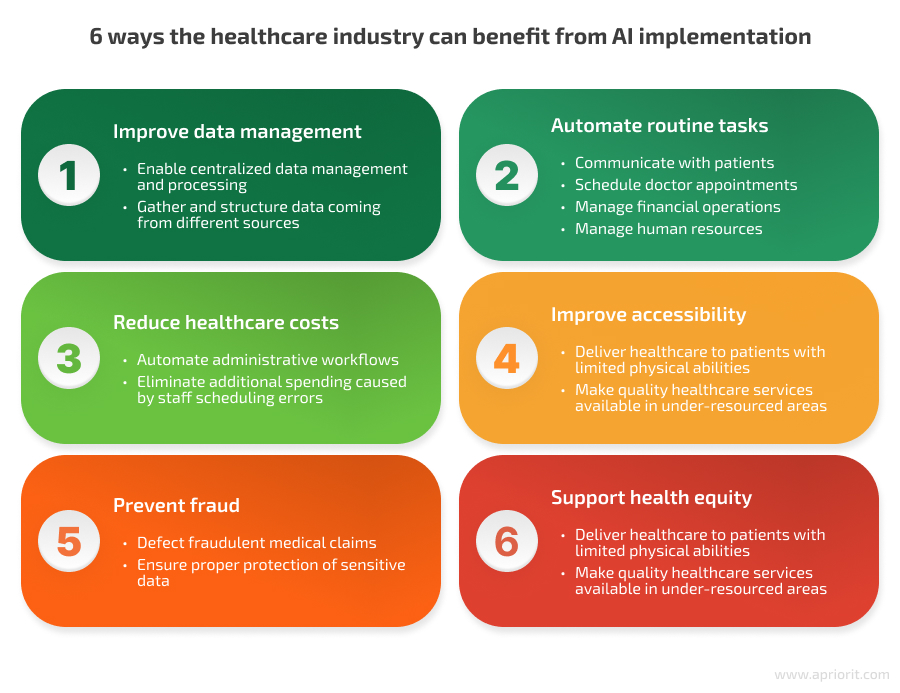
The benefits of GenAI adoption greatly depend on how and to what extent AI is implemented in the daily operations of hospitals and medical researchers. Let’s examine the most common generative AI use cases in healthcare.
Want to take your healthcare solution to the next level?
Reach out to Apriorit’s AI experts to adopt and benefit from this cutting-edge technology.
How to use generative AI in healthcare
GenAI’s strong suit is understanding human speech and human-written text, grasping its context, and providing relevant answers. Thanks to that, you can apply GenAI to any text-related task. When properly trained and adjusted to the needs of a particular healthcare organization, GenAI can be useful for many medical tasks. Here are the key use cases of generative AI in healthcare:
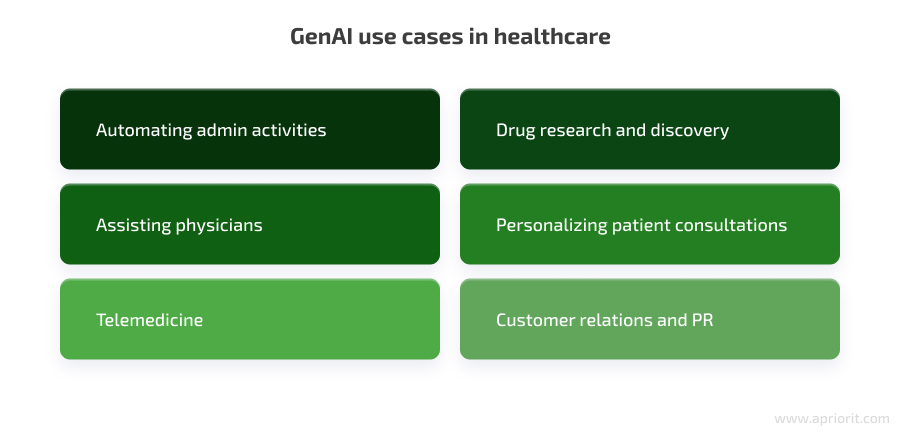
Automating admin activities. Hospitals require a ton of daily administrative work: scheduling patient appointments, processing documents, organizing the workdays of medical professionals, etc. These daily tasks put pressure on administrative employees and can lead to a dip in the quality of care. For example, inefficient scheduling causes long waiting times, and mistakes in document processing can result in errors or even the loss of medical records.
Since a lot of administrative work is text-based, generative AI can partially automate it. An AI-based chatbot can take care of processing incoming requests and scheduling appointments. An LLM-based solution can process and fill out simple healthcare documentation. For example, NexusMD automates the processing of medical images and related communications, and Autonomize AI reviews medical information and assesses financial risk.
Drug research and discovery. Discovering and creating new drugs is extremely time-consuming. The path from the start of research to regulatory approval can take decades and millions of dollars. This, in turn, influences both the availability and affordability of healthcare for patients with currently untreatable diseases.
GenAI’s ability to analyze large professional texts, find correlations, and provide insights can significantly reduce the time and cost of drug discovery. Gartner predicts that by 2025, more than 30% of new drugs and materials will be systematically discovered using generative AI techniques. There are already several AI companies working in this field, including Huma.AI, GE Healthcare Edison, and VantAI.
Assisting physicians. Medical professionals do a lot of routine work when helping their patients: making notes during appointments, entering data into electronic health record (EHR) systems, and detailing diagnoses and recommendations.
With the help of generative AI, healthcare workers can partially or completely automate these tasks. For example, applications similar to Apple’s Math Notes can recognize and transform handwritten notes, synchronize them with an EHR, and add connected notes to patients’ medical histories and treatment recommendations. Applications like Abridge and DeepScribe make time for medical professionals to communicate with patients instead of filling out paperwork.
Personalizing patient consultations. Patients seeking medical help usually have a lot of questions about their symptoms, diagnoses, and prescribed treatments. They aren’t always able to get a professional consultation, so often, patients either get answers online or don’t ask questions, possibly leaving symptoms untreated.
If a healthcare organization has a custom chatbot with access to patients’ medical histories, it can provide patients with verified information. A chatbot can also inform a patient whether they can treat a symptom on their own or should contact a doctor. This way, GenAI helps to provide medical help quicker and reduce the load on medical professionals. Several examples of such applications are Microsoft Health Bot, AgentifAI, and Pingoo.
Telemedicine. Telemedicine provides remote medical assistance to patients who can’t make it to a medical facility. For example, patients with limited mobility or those living in remote areas can get an online consultation from a doctor and pass medical tests using remote monitoring and wearable medical devices.
Generative AI can improve many telemedicine processes. It can facilitate online consultations by gathering patient information before a meeting, aiding the doctor during it, and answering the patient’s questions afterward. GenAI can collect data from patients’ devices, send it to a hospital’s EHR system, and alert patients and doctors of unusual readings. Finally, it can ensure 24/7 support to patients with chronic diseases and special needs. Telemedicine providers can benefit from AI-powered applications like dacadoo, HippocraticAI, and Jorie.
Customer relations and PR. Every private healthcare organization has to think not only about the quality of its services but also its marketing and customer relations. If an organization uses internal marketing and customer support teams, they can optimize many processes with generative AI. For example, chatbots can process complaints about service quality, and a large language model can create promotional texts and images.
Several examples of AI solutions healthcare organizations can use are Zbrain for policy writing and document processing, Tellius for campaign optimization and tracking, and CallRail for communication with patients.
Note that while applications based on generative AI offer more and more smart capabilities, they still require supervision from human experts. AI can make mistakes and definitely can’t replace doctors. It can only work alongside medical professionals and aid them in their work.
Now that we know what generative AI is and how it’s used in healthcare, let’s examine the key limitations of this technology in healthcare.
Related project
Leveraging NLP in Medicine with a Custom Model for Analyzing Scientific Reports
Discover the story of an international medical research organization that used our custom-built natural language processing tool to achieve 92.8% accuracy in their scientific analysis.

Are generative AI adoption challenges solvable?
Despite the many benefits of generative AI in healthcare, medical organizations aren’t rushing to adopt this technology. In a survey by Statista, medical professionals named and assessed the importance of the following GenAI limitations:
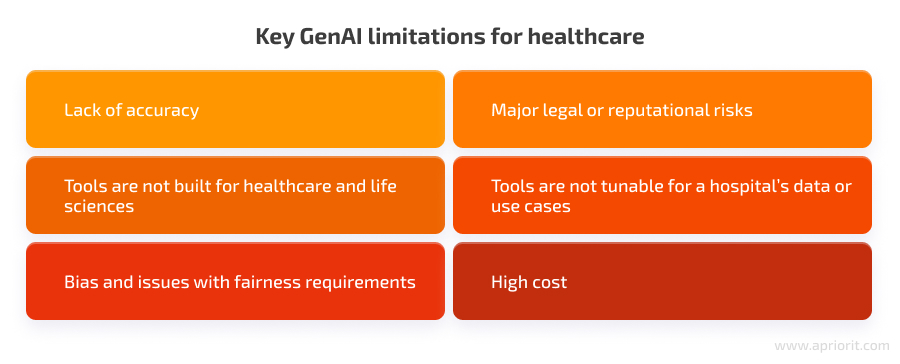
These limitations are quite severe and can put a healthcare organization at risk of patient mistreatment and legal consequences. Adopting GenAI tools also can consume a lot of resources and not provide the desired results.
The good news is that you can address these limitations and risks by partnering with software development professionals who can build a custom AI solution fitted to your requirements. Custom training of an AI model can greatly improve its accuracy and fairness, as well as adjust it to healthcare tasks in general and to a certain hospital’s needs in particular. A custom solution also helps to ensure that your organization complies with IT security requirements like HIPAA.
In our previous post, we discussed in detail the technical and non-technical pitfalls of healthcare AI development and offered practices for avoiding them. We also discussed how to prepare for AI adoption to use your resources wisely and comply with cybersecurity regulations and requirements.
Apriorit is well-equipped to customize an existing AI tool or build a new one from scratch. Let’s see how you can benefit from our knowledge and services.
Read also
Benefits of AI in Healthcare: How to Enhance Your Software and Improve Patient Care
Assess whether your business needs AI tools and prepare to adopt them using professional advice from Apriorit AI developers.
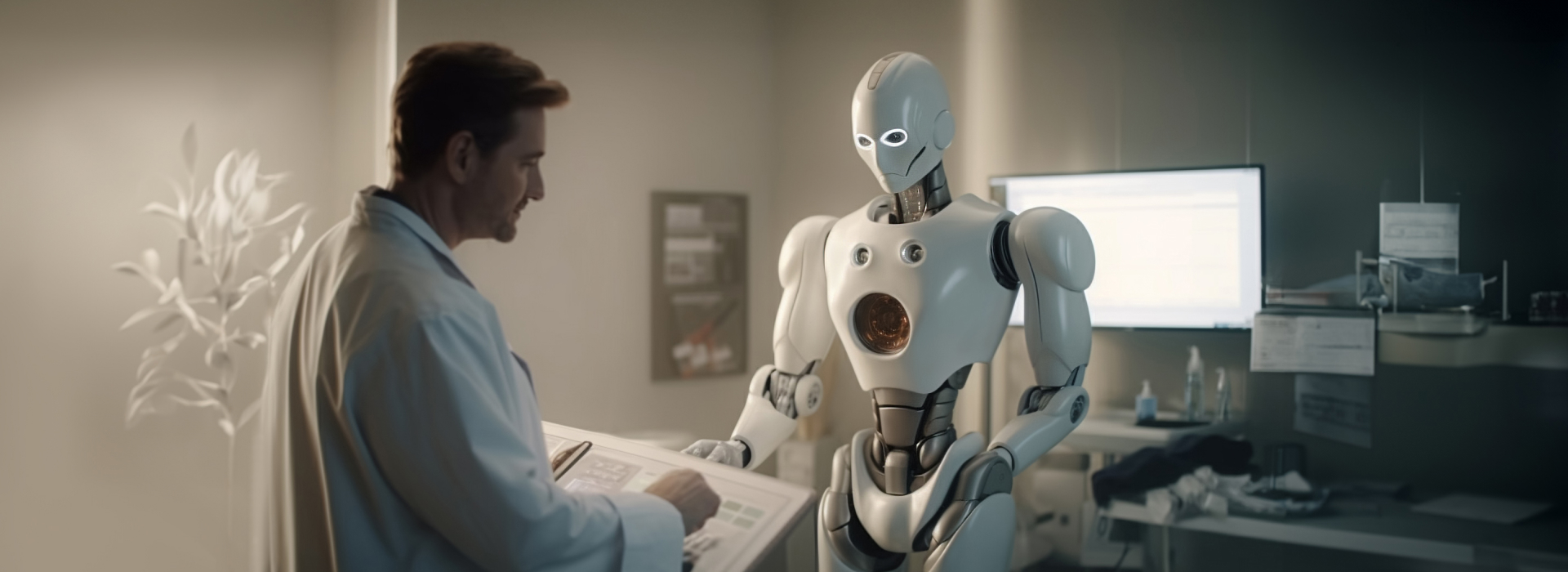
How Apriorit can help develop custom generative AI healthcare software
At Apriorit, we have real-life experience collaborating with healthcare organizations on AI development of both generative and predictive solutions. We understand common requirements, practical challenges in AI adoption, and development approaches and tools for such projects.
You can benefit from our experience at any stage of your AI development project, from requirement discovery and market research to software maintenance. Here’s what we can do for you:
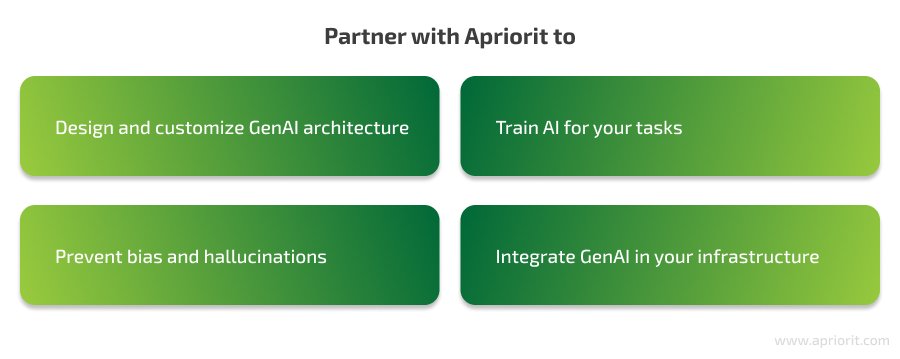
Design and customize GenAI architecture. Our developers have practical experience working with popular LLM models and solutions. We’ll help you choose the most relevant ones for your business goals, plan the customization, and design the architecture for your AI solution.
Train AI for your tasks. Additional training helps generative AI better understand users’ requests and handle healthcare-specific tasks. Such training requires a dataset of medical records. Apriorit’s developers can cooperate with doctors to gather and prepare relevant data, as well as ensure the security and anonymity of this data.
Prevent bias and hallucinations. Generative AI can provide biased and hallucinated responses as a result of improper or insufficient training. Apriorit experts know how to train a custom solution to minimize the risks of biased and false responses.
Integrate GenAI in your infrastructure. To deliver noticeable results, a GenAI tool needs to communicate with a hospital’s databases, mobile devices, EHR and CRM systems, etc. Apriorit developers can build custom APIs to ensure efficient and secure communications of all elements of your IT ecosystem.
Conclusion
Generative AI has the potential to revolutionize the day-to-day work of healthcare providers. It can automate routine activities and take care of patients’ basic requests, allowing doctors to spend more time with patients and hospitals to generate more revenue.
However, this technology has a lot of limitations and adoption challenges that can neutralize its advantages. Apriorit’s generative AI team is ready to share our experience of customizing GenAI models and integrating them with other healthcare software solutions. We’ll help you maximize the benefits from AI adoption and take your healthcare services to a new level.
Want to enhance your healthcare solution with cutting-edge AI?
Let’s choose a fitting GenAI model and customize it for your project’s needs.




